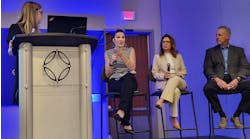In The Beauty of the Beastly, New Views on the Nature of Life, author Natalie Angier writes, “… I hope to inspire in readers an appreciation for diversity, for imagination, for the twisted, webbed, infinite possibility of the natural world. Every single story that nature tells is gorgeous.” Understanding and harnessing the awesome power of change plays a significant role in facilities management as well. In his newest book, Seth Godin has explored the intersection of business management and evolutionary biology. Survival Is Not Enough (Simon & Schuster, 2002), his latest endeavor, attempts to help readers accept that change is not something to be managed; rather, change is ongoing. “The thesis of the book is that things that evolve do better than things that don’t,” says Godin.Godin, a best-selling author and popular speaker, has produced numerous business management and marketing books. Founder and chief executive officer of Irvington, NY-based Yoyodyne, a leading interactive direct marketing company, and former vice president at Yahoo, he helped integrate direct marketing, permission marketing, and Internet promotion into Yahoo’s marketing online program.For many years, he has been intrigued by the power and implication of Charles Darwin’s ideas on natural selection. As a former columnist for Fast Company, Godin wrote on the issue of change in business management. “I saw how the two ideas could fit together,” says Godin.One example of the importance of accepting change as the norm is within Godin’s former office. Working out of a generous 7,000-square-foot loft, every employee had to move all of their stuff and change their desk every 90 days. The initial move was very stressful. “But by getting people over that, by helping them understand that it is not the end of the world to move their desks, then when real things came along it was easier for them to change,” explains Godin.“I want people to get out of the mindset that change is something you have to deal with and then you can go back to your job,” says Godin. Today, job duties are changing all the time. Emerging technology, which allows everything to be connected and information-sharing to be instantaneous, makes change happen even faster. Godin encourages facilities managers to adopt lots of small changes regularly to reduce stress and to keep ahead of the competition.Accepting continuous change is challenging when it comes to millions of square feet of commercial space. “The mindset says how can we take the biggest, most expensive fixed asset in our lives, a building, and make it flexible, make it zoom,” says Godin. Part of the lesson of Survival Is Not Enough is learning to build flexible spaces, daring to experiment to compensate for changing future needs.To develop an adaptative organization, it is crucial to attract, recruit, and retain forward-thinking employees – workers who make an organization zoom. Zooming, the idea of making small changes effortlessly, is a crucial concept to understand. One example Godin cites is Paul Orfalea, founder of Kinko’s, who encouraged employees to experiment, such as having a 24-hour copy center. Orfalea then spread the successful ideas to other locations. This encouraging environment not only spawned new ideas and improved business, it attracted more creative, innovative thinkers to the company.Godin urges building owners to identify and listen to the most progressive people in their organization and allow for experimentation with the design, layout, and function of some of their commercial space. Adds Godin, “Try something and fail. You will learn way more than if you just sit around doing the same things your grandfather did.”Regina Raiford ([email protected]) is senior editor at Buildings magazine. For more information on Seth Godin’s Survival Is Not Enough, check out (www.zoometry.com).
Voice your opinion!
Voice your opinion!
To join the conversation, and become an exclusive member of Buildings, create an account today!
Sponsored Recommendations
Sponsored Recommendations
Latest from Industry News
Latest from Industry News
Sponsored
Sponsored

